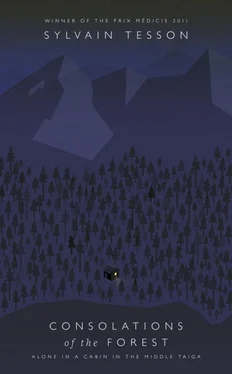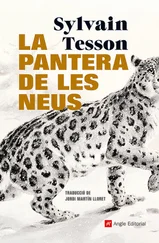The wind has blasted the snow from the lake surface and given the ice back to me. I skate for two hours beneath a chilly sun listening to Maria Callas.
This evening, since I’ve nothing much to do after having brought in enough wood for five days, I jot down the reasons for my retreat.
REASONS WHY I’M LIVING ALONE IN A CABIN
I talked too much
I wanted silence
Too behind with my mail and too many people to see
I was jealous of Crusoe
It’s better heated than my place in Paris
Tired of running errands
So I can scream and live naked
Because I hate the telephone and traffic noise
23 MARCH
I snowshoe along the lakeshore and through the woods all day long. This idea that landscapes have a memory. An agricultural plain remembers the ringing of the Angelus bell. A meadow full of poppies remembers the puppy loves of childhood. But here? The forests have no memories. They are without transformation, without history, they say nothing, and no echo of human actions lingers beneath their foliage. The taiga spreads over the land for itself alone. It covers slopes, storms up to peaks without owing anyone anything. Man finds nature’s indifference towards him hard to bear. The sight of a virgin forest gives him dreams of germination and production. Where man’s gaze falls upon the taiga, his axe soon falls in turn. Ah, the anguish of industrious creatures who suddenly realize that the wilderness does very well without them… Who loves nature for its intrinsic value and not for its gifts? In The Roots of Heaven , Romain Gary presents a concentration camp prisoner who holds up better than his companions: lying in his bunk at night, he closes his eyes and pictures herds of wild elephants. Knowing that out there on the savannahs these mighty beasts range free is enough to put steel in his soul. Thinking about the pachyderms gives him strength. And as long as there are taigas empty of man, I’ll feel good. There is consolation in wildness.
I climb to the very top of the rise and build a big fire up there, in the shelter of a granite boulder. Cooking some soup gives me an excuse to sit quietly looking at the cadaverous face of the lake, with its blue and purple blotches, its marbling, its patches and lichens.
24 MARCH
I don’t dare get up this morning. My will is roaming freely in the field of blank days. The danger: remaining paralysed until nightfall, staring at the whiteness thinking: God, how free I am!
It’s snowing again. There’s no one. Not even a vehicle in the distance. The only thing passing here is time. The happiness in my life at seeing the titmice appear… Never again will I make fun of those old ladies who cherish a canary at the centre of their lives or coo over their poodles with baby-talk on the posh pavements of Auteuil. Or those old men in the Tuileries carefully feeding pigeons with the birdseed they clutch in little paper bags. Hanging out with animals makes one young.
Lady Chatterley . In chapter 7, Clifford, no question, is a suffocating presence, he disgusts poor little Constance: ‘…he talked, always talked; infinite small analysis of people and motives, and results, characters and personalities, till now she had had enough. For years she had loved it, until she had enough, and then suddenly it was too much. She was thankful to be alone.’ I close the book, go outside, dig the axe out of the snow and for two hours, whack away like a madman at the chopping-block, galvanized by Lady Constance. There’s more truth in the blows of my axe and the cackling of the jays than in droning psychological explication. ‘What must first be proved is worth little’ (Nietzsche in the Twilight of the Idols ). Letting life express itself through blood, snow, the cutting edge of the axe and the gleam of sunshine on a chattering rook.
Today, out in the snow, I retrieve my bormash trap, delicately breaking the ice to avoid disturbing the boughs. I spread out a blanket, lift up the branches, and shake them over a bucket. Thousands of organisms quiver in the clear water. I pour them into a bottle – and I have my bait. In a few days, I’ll go fishing.
You have to have a warped mind to think Lady Chatterley’s Lover is an erotic novel. The book is a requiem for wounded nature. The England of peaceful woods and pastures, of leafy glades full of memories, is dying before the heroine’s eyes. Mining is ravaging British soil. The pits are gutting the land, the smokestacks rise into smudged and gritty skies. The air stinks, soot stains the brick buildings, even men’s faces are growing hard. The country is prostituting itself to industry and a new race of businessmen-technicians expounds abstract socio-political themes and speculates about technology. It’s the death agony of the world. ‘The industrial England blots out the agricultural England.’ Constance feels the sap rise in her flesh; she understands that progress de-substantializes the world. Lawrence puts prophetic words into the young woman’s mouth as she protests against the uglification of the countryside, the debasement of the human spirit, the tragedy of a people losing its vitality (‘its manhood’, she says) in the drumbeat of mechanization. Primitive and pagan love blossoms within Lady Chatterley at the same time as she witnesses the shipwreck of the modern soul, sucked into a sinister energy: a Promethean ‘madness’ weakens humanity in the din of the machine. In his Confession , Gorki stakes out the opposing position: as a revolutionary he rejoices in Russia’s immense dedication to progress, and he predicts that the monstrous energy concentrated in industrial centres will spread throughout the world in a magnetic cloud. This psycho-physiological force will persuade all the peoples of the Earth to roll up their sleeves to make every tomorrow sing. Lawrence was anxious about the titanic nervous tension roiling the world. Gorki hailed it with all his heart. Lawrence knew that the sweet peacefulness of the countryside is one face of its beauty. Gorki believed only in the splendour of skies crackling from the metallurgy of iron and steel. And Constance, sweating with desire, suffering the Passion of the Earth, cries out beneath the sheltering boughs of the forest like a tragic actress – whose lament has already been drowned out by the clatter of machines: ‘Ah God, what has man done to man?’
This evening, I contemplate the lake, sitting on my wooden bench beneath the canopy of cedars. This above all: a lovely landscape before one’s eyes. Then everything can fall into place, life may begin. Lady Chatterley is right. And I’d be delighted to welcome her here for a few days, I tell myself, before going off to bed.
25 MARCH
Up with the sun. Faced with such glory, I go back to bed for a bit. This morning the weather allows me to go outside for the first time in days. I climb up to the waterfall by a different route, along the right bank of the torrent. The forest awaits, clotted with snow: my real test. Two hours to get through a quarter-mile of uneven terrain. Woodpeckers hammer at the dead trees. Then I have an eighth of a mile of good hard footing. After that, the ordeal of crossing a deep, narrow valley full of dwarf pines. I tumble into pitfalls three feet deep. I’m aiming for a granite ledge a little over 300 feet above the iced-over waterfall. From below, with my binoculars, I think I see a platform suitable for a bivouac.
Fine snow is blurring my vision of the lake lying placidly at the foot of the mountain. My intuition was good: at an altitude of 3,610 feet, the rocky ridge offers a perfect shelf, a spectacular observation post. A wonderful place for an idyllic night of love. I’ve got the venue, anyway; that’s already something.
Читать дальше












